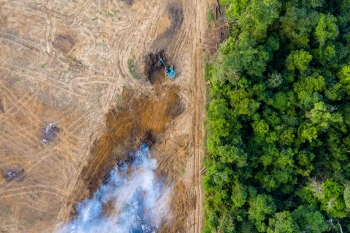USAID-funded Amazon Business Alliance is led by the Rob and Melani Walton Sustainability Solutions Service and the Center for Biodiversity Outcomes
Peru’s natural resources are under threat of overconsumption due to unsustainable land use, rapid development and poor land management. Entrepreneurs in Peru also lack resources to build viable enterprises that are reliant on those natural resources.

To tackle these issues, the United States Agency for International Development (USAID) funded the Amazon Business Alliance (formerly the Amazon Development Entrepreneurial & Learning Alliance (ADELA) program) to “engage investors, entrepreneurs and conservation-focused businesses to promote green growth, and decrease deforestation and natural resource degradation, while improving community livelihoods.”Peru’s natural resources are under threat of overconsumption due to unsustainable land use, rapid development and poor land management.
The USAID program emerged while Percy Summers, project lead for Conservation International, was in residence at Arizona State University as a Conservation International-Center for Biodiversity Outcomes professor of practice. Both ASU and Conservation International responded separately to USAID’s call for conceptual approaches to developing sustainable solutions for these challenges, but in seeing how they could work together, Conservation International and ASU decided to join forces to submit the combined Amazon Business Alliance proposal.
The project will now continue its work at ASU with leadership from the Rob and Melani Walton Sustainability Solutions Service and the Center for Biodiversity Outcomes (CBO), supporting the Alliance's endeavors to create local, sustainable economic opportunities and bolster green investments.
“Even though both CBO and Conservation International are experts at biodiversity conservation, this USAID opportunity specifically sought to integrate economic development with conservation,” said Rajesh Buch, director of business development at the Solutions Service. “The work that the Solutions Service has done in partnership with the city of Phoenix (through the Resource Innovation and Solutions Network) to enhance and optimize their resource management programs and practices over the course of 2013–19 uniquely positioned ASU to integrate these disciplines to develop a holistic approach to job creation and resource conservation.”
Leah Gerber, founding director of the Center for Biodiversity Outcomes, will serve as principal investigator on the project.
“The Amazon Business Alliance brings together CBO and the Solutions Service to innovate ways to integrate biodiversity and other sustainable development goals into green economic development," she said. "While we focus on Peru for this project, our work lays the foundation for extensions and applications globally.”
The Solutions Service will help design and train organizations and individuals to operate an economic development platform that documents the strengths, opportunities and challenges in the Ucayali and San Martín regions of Peru. They will also generate a report on the markets, human capital, culture, finance/investor networks, support and policy, then produce recommendations based on the findings. The Center for Biodiversity Outcomes will assist by building and testing biodiversity-restoration decision support tools that will analyze the costs and benefits of potential interventions for the region.
Conventional economic development tools focus on creating the enabling conditions for economic development and commerce, but do not take resource extraction and consumption into account. The ASU team is pioneering and innovating a methodology that integrates economic development and biodiversity management tools so that local and regional commerce and job creation can be stimulated, while natural resources can be sustainably consumed.
The project hopes to spawn around 100 business- and environmentally friendly development projects, create new investment opportunities, help Peru reduce greenhouse gas emissions, improve livelihoods for Indigenous communities, reduce deforestation and more.